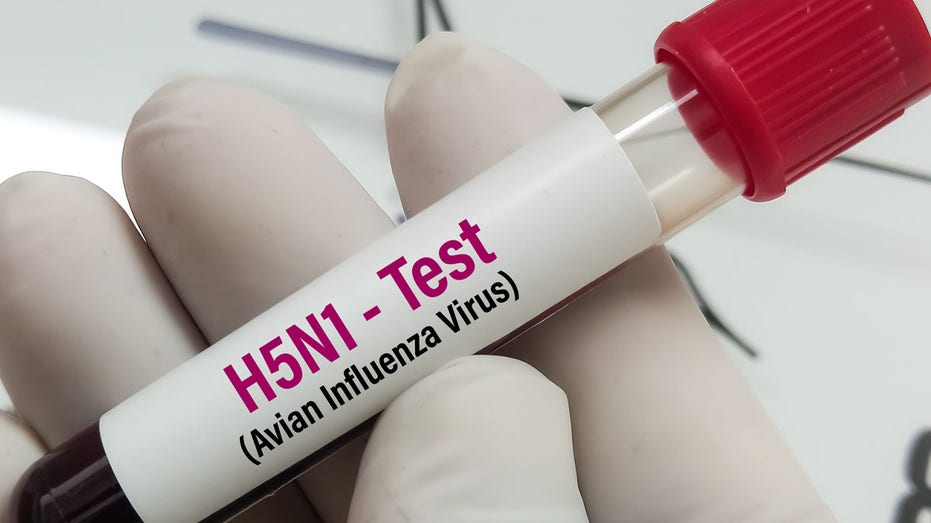
Bird flu (H5N1) continues to spark warnings around the country.
On Friday, the Centers for Disease Control and Prevention (CDC) confirmed the country’s first severe case of bird flu in a human.
The patient, who lives in southwestern Louisiana, is currently hospitalized, according to a release from the Louisiana Department of Health (LDH).
BIRD FLU SURGES IN SEVERAL US STATES WITH REPORTS OF NEW OUTBREAKS: ‘GETTING WORSE’
The infected person is known to have been exposed to sick and dead birds that are “suspected to have been infected,” the same source stated.
The LDH is working with the CDC on genomic testing of the virus infecting the hospitalized patient. Fox News Digital reached out to the department for comment.
There have been a total of 61 human cases throughout the country since April.
No human-to-human transmission has been reported, leading the CDC to maintain its stance that risk to the public is low.
GOVERNOR NEWSOM DECLARES STATE OF EMERGENCY IN CALIFORNIA DUE TO BIRD FLU
Despite the low risk, California Gov. Gavin Newsom on Wednesday declared a state of emergency due to the bird flu.
The declaration follows an outbreak of the virus among dairy cows in Southern California farms, according to the news release on the governor’s website.
“This proclamation is a targeted action to ensure government agencies have the resources and flexibility they need to respond quickly to this outbreak,” Newsom said in a statement.
“Building on California’s testing and monitoring system — the largest in the nation — we are committed to further protecting public health, supporting our agricultural industry, and ensuring that Californians have access to accurate, up-to-date information,” he continued.
“While the risk to the public remains low, we will continue to take all necessary steps to prevent the spread of this virus.”
Sam Scarpino, PhD, director of AI and life sciences at Northeastern University in Boston, said the “tragic case” in Louisiana is evidence of the “widespread nature” of H5N1 in the U.S.
“It also reinforces the very serious situation we are facing,” he told Fox News Digital.
“We need to take more decisive action to control the spread of H5N1 in animal populations. Until then, we will continue to see human spillover cases, and some of them will unfortunately be severe.”
Dr. Marc Siegel, clinical professor of medicine at NYU Langone Health and Fox News senior medical analyst, pointed out that this severe case represents just one instance of the infection and is not necessarily cause for alarm.
“We’d have to know more about the patient’s particular medical details,” he told Fox News Digital. “We can’t conclude [from one case] that it’s becoming more severe in humans.”
Previous iterations of bird flu have had a 50% death rate in humans, Siegel noted, but the 61 human cases in the U.S. this year have been “very mild.”
“That is actually a good sign, that the virus is mutating away from severity, as traditionally H5N1 makes humans very sick,” he told Fox News Digital.
CLICK HERE TO SIGN UP FOR OUR HEALTH NEWSLETTER
The most critical thing to watch, according to the doctor, is whether bird flu will begin to spread from human to human.
“That’s the key thing we’re concerned about — that it doesn’t get into the upper respiratory tract among humans,” Siegel said.
“It hasn’t up until now, and that’s because it would take some mutations — at least one. We’re tracking that, but probably not closely enough.”
The vast majority of recent human cases have stemmed from direct contact with animals, he said — “but it’s now spread into the cattle population and into milk, which worries a lot of people, including me.”
Rebecca C. Christofferson, PhD, associate professor in the Department of Pathobiological Sciences at Louisiana State University, commented to Fox News Digital about the potential for a pandemic.
“Bird flu is a group of influenza viruses that primarily circulate among bird populations,” she told Fox News Digital.
“However, influenza viruses are also known to jump species, and bird flu has done this a few times in history.”
“The more the virus gets into mammals and then the more it passes from mammal to mammal, the greater the concern that it will adapt to mammals and spread more easily among them and then spill over into humans,” Christofferson added.
“Nobody wants another pandemic.”
For more Health articles, visit foxnews.com/health
The good news, Cristofferson said, is that it’s easy to protect yourself from catching bird flu.
“If you have to handle birds or suspected ill animals (or be around ill people), wearing gloves and masks and washing your hands will protect you as it does with other respiratory viruses,” she said.
Bird flu (H5N1) continues to spark warnings around the country.
On Friday, the Centers for Disease Control and Prevention (CDC) confirmed the country’s first severe case of bird flu in a human.
The patient, who lives in southwestern Louisiana, is currently hospitalized, according to a release from the Louisiana Department of Health (LDH).
BIRD FLU SURGES IN SEVERAL US STATES WITH REPORTS OF NEW OUTBREAKS: ‘GETTING WORSE’
The infected person is known to have been exposed to sick and dead birds that are “suspected to have been infected,” the same source stated.
The LDH is working with the CDC on genomic testing of the virus infecting the hospitalized patient. Fox News Digital reached out to the department for comment.
There have been a total of 61 human cases throughout the country since April.
No human-to-human transmission has been reported, leading the CDC to maintain its stance that risk to the public is low.
GOVERNOR NEWSOM DECLARES STATE OF EMERGENCY IN CALIFORNIA DUE TO BIRD FLU
Despite the low risk, California Gov. Gavin Newsom on Wednesday declared a state of emergency due to the bird flu.
The declaration follows an outbreak of the virus among dairy cows in Southern California farms, according to the news release on the governor’s website.
“This proclamation is a targeted action to ensure government agencies have the resources and flexibility they need to respond quickly to this outbreak,” Newsom said in a statement.
“Building on California’s testing and monitoring system — the largest in the nation — we are committed to further protecting public health, supporting our agricultural industry, and ensuring that Californians have access to accurate, up-to-date information,” he continued.
“While the risk to the public remains low, we will continue to take all necessary steps to prevent the spread of this virus.”
Sam Scarpino, PhD, director of AI and life sciences at Northeastern University in Boston, said the “tragic case” in Louisiana is evidence of the “widespread nature” of H5N1 in the U.S.
“It also reinforces the very serious situation we are facing,” he told Fox News Digital.
“We need to take more decisive action to control the spread of H5N1 in animal populations. Until then, we will continue to see human spillover cases, and some of them will unfortunately be severe.”
Dr. Marc Siegel, clinical professor of medicine at NYU Langone Health and Fox News senior medical analyst, pointed out that this severe case represents just one instance of the infection and is not necessarily cause for alarm.
“We’d have to know more about the patient’s particular medical details,” he told Fox News Digital. “We can’t conclude [from one case] that it’s becoming more severe in humans.”
Previous iterations of bird flu have had a 50% death rate in humans, Siegel noted, but the 61 human cases in the U.S. this year have been “very mild.”
“That is actually a good sign, that the virus is mutating away from severity, as traditionally H5N1 makes humans very sick,” he told Fox News Digital.
CLICK HERE TO SIGN UP FOR OUR HEALTH NEWSLETTER
The most critical thing to watch, according to the doctor, is whether bird flu will begin to spread from human to human.
“That’s the key thing we’re concerned about — that it doesn’t get into the upper respiratory tract among humans,” Siegel said.
“It hasn’t up until now, and that’s because it would take some mutations — at least one. We’re tracking that, but probably not closely enough.”
The vast majority of recent human cases have stemmed from direct contact with animals, he said — “but it’s now spread into the cattle population and into milk, which worries a lot of people, including me.”
Rebecca C. Christofferson, PhD, associate professor in the Department of Pathobiological Sciences at Louisiana State University, commented to Fox News Digital about the potential for a pandemic.
“Bird flu is a group of influenza viruses that primarily circulate among bird populations,” she told Fox News Digital.
“However, influenza viruses are also known to jump species, and bird flu has done this a few times in history.”
“The more the virus gets into mammals and then the more it passes from mammal to mammal, the greater the concern that it will adapt to mammals and spread more easily among them and then spill over into humans,” Christofferson added.
“Nobody wants another pandemic.”
For more Health articles, visit foxnews.com/health
The good news, Cristofferson said, is that it’s easy to protect yourself from catching bird flu.
“If you have to handle birds or suspected ill animals (or be around ill people), wearing gloves and masks and washing your hands will protect you as it does with other respiratory viruses,” she said.






